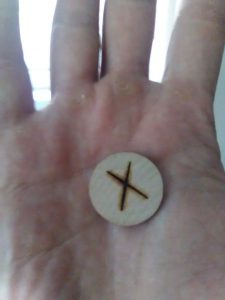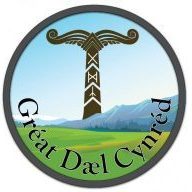
The spring sun warmly embraces us as I stand outside with the others. We have gathered at the edge of the farmhouse property. The air is an interesting mixture of flora in full bloom and pungent scents wafting in from the nearby barn. Just beyond us lay a copse of woods; hiding within are a few semi-tame deer trying to furtively inch closer to the corn feed laid out for them.
The fire pit had been set up in advance; within its hallowed perimeters flames ungulate to the proceedings. The smoke and wind sometimes conspire to assail my nostrils.
“Who else brings offerings or praise?” The clergy beckons to the celebrants.
The space having been hallowed previously, and the gods and spirits formally invited with reverent invocations, the community now stands ready to propitiate its supernatural benefactors. We approach the flames.
A man calls to a god for whom he has particular devotion; he leaves a stick of incense in acknowledgment of the god’s powers.
“Who else brings offerings or praise?”
A woman entreats the attentions of a goddess. She tells us a short but powerful story of an intervention where the goddess blessed her and her family. A loaf of bread she baked with special fervor is thrown into the fire. The flames rapidly devour it.
“Who else brings offerings or praise?”
A man calls to his ancestors. From the halls of death where they dwell, the honored dead maintain vigil over their descendants. The man pours an alcoholic drink, something the spirits had enjoyed in their earthly life. The liquid splashes the rocks that define the perimeter of the fire pit. It bubbles, it smokes, and eventually evaporates into the ether.
“Who else brings offerings or praise?”
And so the proceedings endure, till all those within the gathering have offered their gifts to the unseen but imminent forces that shape their lives.
To the deer peering warily at us from their wooded environs, perhaps we seem a strange amalgamation of humans huddled around a fire, throwing precious food and drink into the flames for naught. Nay, we are more than this. We no longer stand somewhere on the outskirts of Gettysburg on a spring day in the modern era.
No. We stand at the Center of All Things.
Within the sacred space we have erected, all worlds meet, all layers of reality confluence together into a singular point. Time spirals in on itself; past and future blend in mythic unison. We are in a time, in that time, where gods and humans first interacted. In the Sacred Center we stand before our gods to gift them, and to ask for gifts in return.
A gift for a gift.
There are a great deal of people out there these days doing a lot of things in the name of the Germanic gods. Outsiders lump us together precariously under a big tent, whether we like it or not.
There are appreciable cleavages between the various factions. I am not here to rehash the arguments in blood-curdling minutiae. Rather, let me tell you what we are about, and where it may place us within this landmine-filled landscape of Heathenry.
We in GVK have a central assumption about how this religion should work. Our theology, if you will, is about gifting. A gift for a gift.
Pre-Christian Indo-European religions operated under the assumption of do ut des: I give so you may give. Individuals and communities entreated their supernatural benefactors with offerings and praise, inviting the blessings and protection of these beings in return. Likewise, gifting was quite often the social glue that cemented bonds between host and guest, leader and follower, and between friends.
We are defined by the gifts we give to our gods, ancestors and landwights. We stand at the Sacred Center of time and space where humans can gift their gods, and the gods reciprocate.
“Who else brings offerings or praise?” So our weofodthegn, our altar-priestess, asks at every rite. The emphasis is on the gift, the act of gifting. It is not on he or she who brings the gift. “Who else brings praise of offerings?” She did not ask you how many books on Heathenry you have read. She did not ask you if you were a great warrior or magician, or just a common soul. She did not ask you if you came dressed up in modern street clothes or garbed in Viking finery. She most certainly did not ask you if you had non-European ancestors, what gender you identify as, or what orientation defines your sexuality.
No. She asked … who here brought a gift for the gods and spirits? That’s who we are, and that’s what we care about.
When you understand this, then the confusing morass of factions and cleavages within Heathenry narrows considerably. If a group claiming to be “Heathen” operates under a theological assumption other than gifting, then we do not consider them within the same religious landscape as us. They are something else. These deviations sometimes take comical turns, and at other times tragic and oppressive ones.
There are paradigms in so-called Heathenry that simply seem to miss the point entirely. Some Heathens are obsessed with following a code of short hand ethics, usually enumerated into some version or another of nine pithy concepts. “Strength,” for example. It’s good to be strong, yes. Unfortunately, some who take these codes too seriously seem to operate as Boy Scout groups eternally trying to collect proverbial badges for their virtues. Others may craft a veritable “religion” out of stereotypical Anglo-American notions of rugged individualism, superficial understandings of Viking warrior prowess, and usually some Nietzschean platitudes thrown in.
All the while, one wonders what, theologically, unites them to the gods they claim to follow. We are happy if one is “strong” and “industrious” and whatever other virtues one wants to exhibit. But does one gift the gods? Or are the gods just symbols in some kind of post-modern self-empowerment fantasy? If the latter, then they are not people we recognize as co-religionists.
Likewise, a common refrain in Heathenry is that “we are our deeds” – an admonishment to live an ethical life and think deeply about what one places in the well of Wyrd. No one in this kindred would deny that an ethical life is important. But “we are our deeds” seems somehow limited as a theological imperative for Heathenry. If one’s deeds does not include gifting the gods, then one is not a Heathen, but a virtuous agnostic with a fetish for Germanic mythology.
Likewise if one’s deeds seem obsessed with socializing with people of the same ethnicity, rather than gifting the gods, then one is not practicing Heathenry as we understand it. Rather, one is spuriously articulating, under the façade of Heathenry, a socio-political platform that derives from a deranged 20th century Catholic.
The emphasis then should be placed firmly within a specific theological dynamic. Within the Sacred Center, we are defined by the gifts we give to the holy powers. Within the Halls of Frith, we are defined by the gifts we give to our oath-brothers and oath-sisters.
A gift for a gift. We are our gifts.
